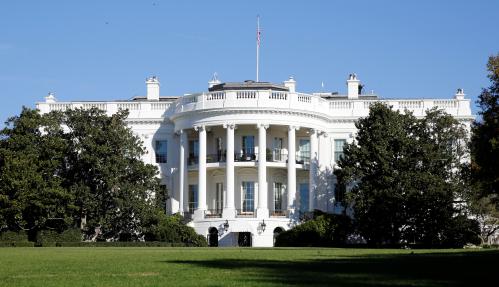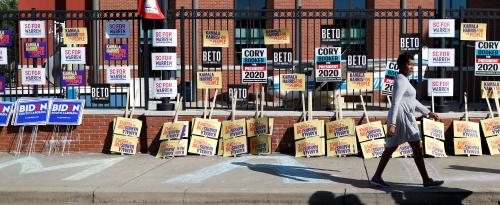Education is hardly the only issue driving the 2020 presidential campaign, but policies affecting schools and students are emerging as some of the most discussed. From addressing the cost of college, to increasing access to quality education, to improving teacher recruitment and retention, to realigning education curricula with workforce needs, many of the top candidates’ policy proposals could have a significant impact on students and teachers across the country.
On Oct. 11, The Brown Center on Education Policy at Brookings hosted a public event with former U.S. Secretaries of Education Arne Duncan and John B. King Jr., moderated by journalist Alyson Klein of Education Week. The conversation highlighted opportunities for investment and policy changes in education that would benefit American students most in need.
Duncan and King discussed a wide range of topics impacting early childhood education, K-12, and higher education. For example, each talked about the need for free, high-quality pre-K programs. Duncan cited research showing a $7 return on investment for every $1 invested in high-quality preschooling opportunities. He argued that redirecting funds from incarceration (approximately $60,000 per arrest) to early childhood education programs would be beneficial for American students and society at large.
King commented on growing disparities in higher education in terms of equity, saying, “There are states that say they have free college, … and they have done nothing for their low-income students.” He expressed concerns about too many students dropping out of college because policymakers lack perspective on the overall cost of college, which includes necessities like food and shelter. “We should be talking about the total cost of college, not just tuition,” said King. In response to a question about free college proposals, Duncan noted that free college is a strategy, not a goal, and we should be clear about our goals for higher education. “Before I do free college, I would do free pre-K,” Duncan said. “Our babies have to get off to a good start.”
.@JohnBKing: “We have no future—our democracy has no future—if we don’t get better at educating our low-income students and students of color.” #Education2020
— Brookings Brown Center (@BrookingsEd) October 11, 2019
The former secretaries also spoke extensively on opportunities for policymakers to improve equity, integration, and safety in American schools. King offered several examples of how the federal government could promote integration in K-12 schools. For example, he cited The Strength in Diversity Act as an opportunity to support local efforts to integrate, along with noting the need for enforcement measures by the departments of Education and Justice. On the topic of school safety, Duncan spoke in personal terms about his experiences with gun violence in his work in Chicago—both before and since his time as education secretary—and with the shooting at Sandy Hook Elementary School. He expressed dismay that there continues to be a lack of political will to meaningfully address gun violence.
The event concluded with a final question from Klein asking the former secretaries about their preferred presidential candidate in the 2020 election. While neither panelist endorsed a candidate, Duncan challenged American voters to make education policy a voting issue. In closing, both Duncan and King emphasized the importance of this coming election for the fate of not just education, but for American democracy itself.
Click on the below timestamps to view the relevant portion from the event:
- School choice (2:27)
- Pre-K (4:42)
- Title I funding (8:14)
- Teacher pay and evaluations (10:44)
- Teacher diversity and placement (13:55)
- Integration (15:59)
- Higher education (19:07)
- Standards (26:32)
- Safety and gun control (32:17)
- Vocational education (38:47)
- Presidential endorsements and Q&A (42:31)
Header image via C-SPAN.





Commentary
Highlights: Arne Duncan and John King on how to improve education in America
October 14, 2019